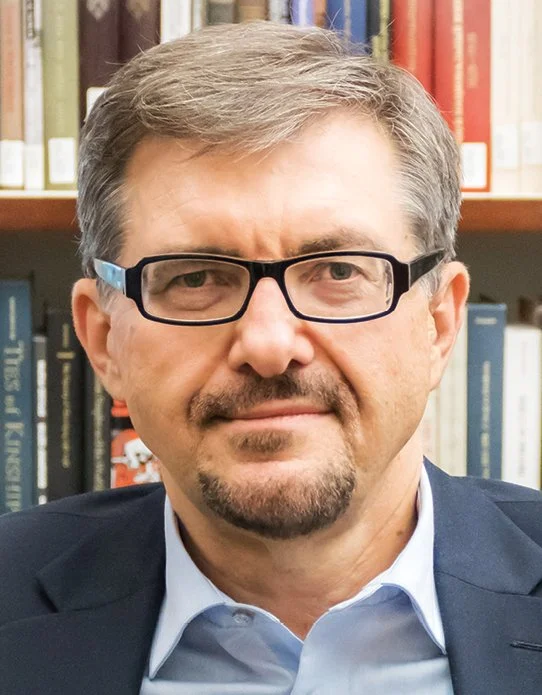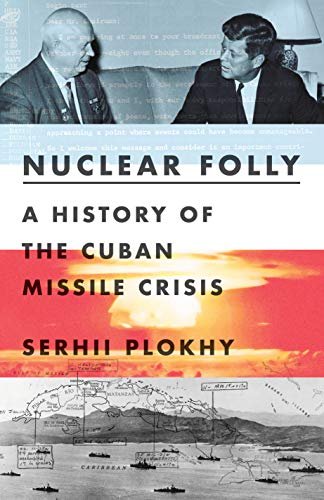Between Progress and Putin
What would it take for Russians to loosen Putin’s grip on power? The ingredients are already in play.
Read
Ukrainians took to the streets twice in 10 years to defend their fledgling democracy. The first time, it seemed an election might be stolen. Then the government broke a pledge to bring the country closer to Europe — and the people pushed back. Now Ukraine is mired in conflicts with ethnic-Russian separatists in the east and with Russia itself over its annexation of Crimea. But even as Putin wages war on this former Soviet republic, the long-term prospects for Ukraine are strong. On this episode, Harvard University historian Serhii Plokhii explains why.
To begin with, he says, Ukraine has long had a tradition of revolt against empire and authoritarianism. Once the second-largest Soviet republic, it was the first to declare independence from the U.S.S.R. — in a December 1991 referendum that dealt the Iron Curtain a fatal blow. That vote capped a century of fighting for autonomy in a country that has for hundreds of years lain at the crossroads of world powers. Even today, Plokhii says, most outsiders who are aware of Ukraine’s contemporary struggles for sovereignty are largely unfamiliar with the country’s longer trajectory of pluralism and “democracy by default,” forged from invasion, autocratic oppression and mutual resistance.
The Orange Revolution in 2004 was one such show of unity. And with a festival-like atmosphere protestors shut down a brazen effort to throw the presidential election to Russia’s preferred candidate. In 2013 and 2014, Ukrainians took the streets en masse once more, in defense of an association pact with the European Union. Civil resistance prevailed yet again — but the uprising would trigger Russian hostilities that continue to this day, even as democratic institutions in Ukraine continue to flourish, Plokhii says.
Meet
Serhii Plokhii is the Mykhailo S. Hrushevs’kyi Professor of Ukrainian History at Harvard University and the director of the Ukrainian Research Institute. He writes frequently for the Financial Times, the Guardian and other popular publications, and is the author of more than a dozen books, including The Gates of Europe: A History of Ukraine (Penguin, 2016), The Last Empire: The Final Days of the Soviet Union (Basic Books, 2015) and Chernobyl: The History of a Nuclear Catastrophe (Basic Books, 2018). His latest title is Nuclear Folly: A History of the Cuban Missile Crisis (Norton, 2021). Follow Plokhii on Facebook.
The Romans, Ottomans, Austro-Hungarians and Soviets all have held sway over Ukraine across the centuries. Plokhii reviews this tapestry of empires, and the struggle of Ukrainians to throw it off, in The Gates of Europe.
Nuclear Folly brings the missile crisis of October 1962 back to life with spine-tingling detail, following Soviet soldiers in the forests of Cuba and nuclear-armed submarines through the North Atlantic. It also highlights key distinctions in the decision-making processes of a democratically elected president as compared to the premier of a one-party state, with Fidel Castro playing the wildcard in a very dangerous game.
As Plokhii shows in Chernobyl, the Soviet government tried to orchestrate a coverup of the explosion and meltdown of the nuclear plant in northern Ukraine. Read Plokhii’s description of the chaotic evacuation of the town of Prypiat, next door to the reactor.
When the Soviet Union was founded, a great debate took place between Lenin and Stalin over its structure — outlining the shape, paradoxically, of the union’s dissolution 69 years later, Plokhii argues.
He has also written, for the Guardian, about what Vladimir Putin can learn from Vladimir Lenin when it comes to Russian meddling in Ukraine. Short answer: don’t do it.
Learn
Just out: two Washington Post reporters take readers behind the front lines in Donbas, where the land mines seem to outnumber the jobs.
Cyberwarfare has been a key component of Russia’s international relations in the 21st century, and Ukraine often serves as a testing ground for its digital arsenal. Meanwhile, President Biden has said the Kremlin did not order the computer hijacking earlier this month that forced the Colonial Pipeline in the United States to shut down. Still, the attack was apparently launched by hackers based in Russia, which is said to provide safe haven for such criminal groups.
In January, the European Court of Human Rights concluded that police and security forces were to blame for widespread violence during the Euromaidan movement, which just celebrated its seventh anniversary.
Ukraine’s young president Volodymyr Zelensky — a former comedian who entered office with more than 70 percent of the vote in a runoff election — has promised to challenge corruption and the power of oligarchs. But Plokhii and other observers say the jury is still out on whether Zelensky’s rhetoric amounts mainly to good public relations.
And we can’t help but note, in passing, the Belarussian government’s interception of a Ryanair flight from Greece to Lithuania, on Sunday. This stunning exercise of state power, which led to the arrest of a dissident journalist who was on board, prompted the European Union to redirect commercial air traffic away from Belarus and consider new sanctions on the regime of strongman Aleksandr Lukashenko. Arguably, it also underscores why supporting democracy in the former Soviet sphere is so important.





